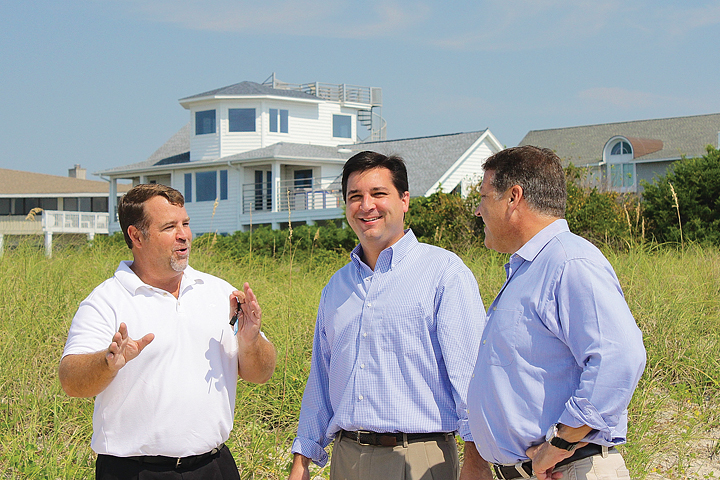Local leaders hoped to gain a new advocate in Washington with a rare opportunity to share concerns about the effect of federal funding and regulations on coastal management projects.
U.S. Rep. Bill Shuster, Republican congressman from Pennsylvania’s 9th district and chair of the House Committee on Transportation and Infrastructure, traveled to Wrightsville Beach for an Aug. 29 roundtable discussion with leaders from New Hanover, Pender and Brunswick counties.
Shuster traveled to southeastern North Carolina at the invitation of David Rouzer, Republican hopeful for North Carolina’s 7th congressional district. His visit marks the first time a chairman of the House committee, which oversees the U.S. Army Corps of Engineers and the U.S. Coast Guard, has come to the area.
Rouzer and Shuster became acquainted when Congress worked through the Water Resources Reform and Development Act (WRRDA) earlier in 2014, which granted a three-year extension for federal authorization of Carolina Beach’s coastal storm damage reduction, or beach renourishment, project. Shuster said Rouzer was an advocate for the extension during negotiations of the law.
Mayors and leaders from beach towns shared experiences and advice with Schuster about many issues, including flood insurance and the Federal Emergency Management Agency, and a proposed expansion of what the Environmental Protection Agency regulates as waters of the United States. Allocation of federal funds, especially for shallow-draft inlets, and growing regulatory oversight were big issues explored during the discussion.
Shuster acknowledged the impact of mounting national debt on funding availability for coastal projects, but said infrastructure maintenance is one of the top federal priorities in the Constitution. He said the visit to North Carolina helps him understand the importance of coastal infrastructure when he returns to Washington.
“Of course, funding is a big issue. We have to prioritize in Washington where we spend the money. … I need to know firsthand. So seeing it, hearing it from the folks here, that’s very, very important and very valuable to me,” Shuster said.
To keep regulations in check, Shuster said balance between Congress and agencies operating under the executive branch, like the U.S. Fish and Wildlife Service and the Division of Marine Fisheries, must be retained. He said over time, that balance was skewed as Congress handed authority to the administration.
“We raise the funds and we determine how the funds are spent. It’s the executive branch’s job to execute what we tell them to execute and again, we’ve given up this authority,” Shuster said.
Rouzer seconded Shuster’s explanation.
“The chairman was right. You’ve got to have more congressional oversight, and Congress can’t keep giving authority to the executive branch,” Rouzer said. “Over a long period of time, Congress granted authority to the executive branch to take care of issues and then to do the kind of broad rulemaking that they’re doing now. We’ve got to swing the pendulum the other way and get it back to the center.”
A handful of Wrightsville Beach community leaders attended, including mayor Bill Blair, town manager Tim Owens, mayor pro tem Darryl Mills, and chamber of commerce chairwoman Sue Bulluck. After the discussion, Wrightsville Beach town officials showed Shuster the benefits of the 2014 beach renourishment around Johnnie Mercer’s Pier and the jetties controlling erosion in Masonboro Inlet.
email [email protected]




